Welcome to the Tobacco Control Implementation Hub resource library
Use the search bar or filters to find guides, sample materials, research articles and more to facilitate tobacco control policy implementation.
Search Global Implementation Publications
Information Filters
- clear all filters
-
Policy area
-
Implementation area
-
Resource type
-
Region
-
Source
Search for your resources:

State of the literature discussing smoke-free policies globally: A narrative review
Author: Teed et al (2024)
Despite the success of the Framework Convention on Tobacco Control (FCTC), most jurisdictions in the world do not have policies that create 100% smokefree environments in indoor workplaces, indoor public places, public transport, or other public places. This paper is a narrative review of articles that discuss smoke-free policies and describe the state of the current literature. 
Towards assessing the tobacco control law enforcement systems within Indian states: a rapid review and document analysis
Author: Bhojani et al (2025)
This study aims to inform a framework for assessing tobacco control law enforcement systems at the state level in India. 
Evaluation of compliance with smoke-free regulations in a multi-ethnic city in Western China: a mixed-methods study
Author: Zhang et al (2025)
China has enacted subnational smoke-free legislations, which requires compliance evaluations to provide data for future implementation planning. This study comprehensively assessed smoke-free regulation compliance in Xining in Western China. 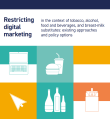
Restricting Digital Marketing
Author: World Health Organization
This publication describes ways in which Member States can translate marketing restrictions in the context of tobacco and other products that create health risk, into the digital environment. It provides an overview of available policy options, best-practices for digital monitoring, and a guide to policy enforcement in the digital environment. Information about enforcement can be found in Section 8. 
Association Between Secondhand Smoke Exposure Among Women and the Implementation of Tobacco Control Measures on Campus
Author: Nian et al (2024)
Exposure to secondhand smoke (SHS) among women is prevalent in China which increases their risk of developing a wide range of diseases and can affect their susceptibility to adverse reproductive health effects. This study aims to examine the association between SHS exposure among women and the adoption and implementation of tobacco control measures on campus in China.

WHO report on the global tobacco epidemic, 2023: protect people from tobacco smoke
Author: World Health Organization
The ninth WHO report on the global tobacco epidemic tracks the progress made by countries in tobacco control since 2008 and, marks 15 years since the introduction of the MPOWER technical package which is designed to help countries implement the demand-reduction measures of the WHO Framework Convention on Tobacco Control.

Smokefree implementation in Colombia: Monitoring, outside funding, and business support
Author: Uang et al (2017)
Assessment of the national smokfree policy implementation in Colombia.
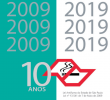
Case Study - São Paulo Breathes Better: Adoption of Smoke-Free Indoor Environments
Author: Pan American Health Organization (2010 & 2019)
This two part case study presents the initial implementation process of tobacco-free environments in São Paulo, Brazil after The São Paulo Anti Tobacco Law was passed in 2009, and it's continued implementation 10 years later. Documents available in Portuguese.

Evaluation of Tobacco Free Film and Television Policy in India
Author: Vital Strategies
This study was conducted to gauge the extent of implementation of the tobacco free film rule in India, to identify patterns in compliance and violations, and to identify opportunities for strengthening the rule.
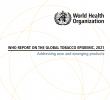
WHO report on the global tobacco epidemic 2021: addressing new and emerging products
Author: WHO (2021)
The eighth WHO report on the global tobacco epidemic tracks the progress made by countries in tobacco control since 2008 including data on electronic nicotine delivery systems, such as ‘e-cigarettes’.

Best practices on implementation of the tobacco advertising and display ban at point of sale (Article 13 of the WHO FCTC): a four-country case study
Author: WHO (2015)
This report reviews the relevant legislation related to the POS advertising and display bans and examines experience with enforcement and monitoring in four countries: Ireland, Norway, Finland and the UK.

Advanced country practices in the implementation of WHO FCTC Article 13 and its guidelines
Author: WHO (2018)
Advanced practices and lessons learned from Parties in the implementation of Article 13, with a focus on combatting cross-border advertising and the depiction of tobacco in entertainment media.

SEATCA Smoke-Free Index
Author: SEATCA (2020)
A report detailing Implementation of Article 8 in the ASEAN region, 2020.

Tobacco retailer density and tobacco retailers near schools in two cities of East India, Ranchi and Siliguri
Author: Pouranik et al. (2021)
This study assesses the number and density of tobacco vendors in the cities of Ranchi (Jharkhand) and Siliguri (West Bengal), and the number of retailers selling tobacco near schools. Both of these jurisdictions have passed local tobacco vendor licensing laws.
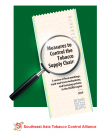
Measures to Control the Tobacco Supply Chain
Author: SEATCA (2019)
A review of fiscal markings, track-and-trace mechanisms, and licensing systems in the ASEAN region.

Article 5.3 implementation in Uganda and the challenge of whole-of-government accountability
Author: Male et al (2022)
This analysis focuses on understanding difficulties in managing industry engagement across government ministries and in developing effective whole-of government accountability for tobacco control.

Compliance with smoke-free policies at indoor and outdoor public places: an observational study in Pakistan
Author: Ahsan et al. (2022)
Study investigating smoke-free compliance across public places in Karachi, the most populous city in Pakistan.
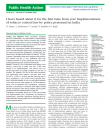
Implementation of tobacco control law by police personnel in India
Author: Ahuja et al. (2018)
Implementation of tobacco control law by police personnel in India. This study aimed to assess knowledge and attitudes.
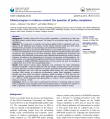
Global progress in tobacco control: the question of policy compliance
Author: Anderson et al. (2020)
This study aims to describe and compare global trends in legislation and compliance of smokefree and TAPS policies between 2009 and 2019.
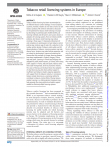
Tobacco retail licensing systems in Europe
Author: Kuipers et al. (2021)
This paper aims to stimulate a discussion on the potential for tobacco retail licencing in Europe and examines the cases of Finland, Hungary, France, Italy and Spain.
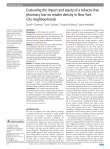
Evaluating the impact and equity of a tobacco-free pharmacy law on retailer density in New York City neighbourhoods
Author: Giovenco et al. (2018)
This study models the reduction in tobacco retailer density following the ban to examine differences in the policy’s impact across neighbourhoods.
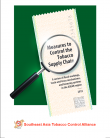
Measures to Control the Tobacco Supply Chain
Author: SEATCA (2019)
A review of fiscal markings, track-and-trace mechanisms, and licensing systems in the ASEAN region.

WHO Key Elements of Tobacco Control Legislation
Author: World Health Organization
The World Health Organizations Tobacco Free Initiative (TFI) list of key elements of legislation for tobacco control.
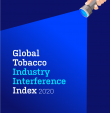
GLOBAL TOBACCO INDUSTRY INTERFERENCE INDEX, 2020
Author: STOP
This report uses publicly available information on tobacco industry interference in 34 countries and their respective governments’ responses to these interferences to interpret key findings and rank the countries on several interference indicators.
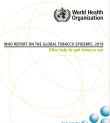
WHO REPORT ON THE GLOBAL TOBACCO EPIDEMIC, QUITTING TOBACCO USE, 2019
Author: World Health Organization
This report, WHO’s seventh in the series, provides a country-level examination of the global tobacco epidemic and identifies countries that have applied selected measures for reducing tobacco use. This report focuses on supporting tobacco users to increase cessation success.

FDA Compliance and Enforcement Report
Author: Food and Drug Administration (US)
Report on the last five years of the FDA Center for Tobacco Products Office compliance and enforcement activities.

ENFORCING Strong SMOKE-FREE Laws: The Advocate’s Guide to Enforcement Strategies
Author: American Cancer Society
This guide examines specific barriers to the enforcement of smoke-free laws and regulations and offers proven advocacy strategies for overcoming these barriers.
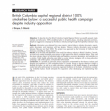
British Columbia 100% Smokefree: Successful Campaign Despite Industry Opposition
Author: Drope & Glantz (2003)
This article describes how the British Columbia Capital Regional District systematically organized an educational campaign, enacted and enforced a series of bylaws, exposed industry interference to successfully pass and implement a 100% smokefree bylaw in all public places.
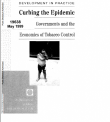
Curbing the Epidemic: governments and the economics of tobacco control, 1999
Author: World Bank
This report analyzes how economic fear influences policymakers when contemplating tobacco control efforts. It also demonstrates the economic benefits of tobacco control policies and the responsibility of governments to reduce potential costs of tobacco control efforts.
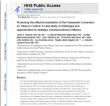
Case Study: Effective Translation of the Framework Convention in Mexico
Author: Thrasher et al. (2008)
This case study describes the impact of the sociocultural and political-economic context of Mexico on WHO-FCTC policy uptake. It examines advancing tobacco control policy through strategic, contextually-specific communication efforts and uses smokefree policy to illustrate barriers to compliance in the Mexican context.

Community Perception of Smokefree Policy in Depok City, Indonesia
Author: Rahmayanti et al. (2019)
This study analyzes the perception of smokefree policy within a university community service program and finds that while many people are aware of smoking's harmful effects, they do not know about smokefree policies, highlighting the need for community education, effective communication, and engagement.
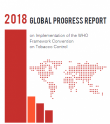
WHO FCTC Global Progress Report, 2018
Author: World Health Organization
The 2018 global progress report on the implementation of WHO FCTC.

Assessment of EU Member State National Characteristics and Their Association with Smoking Prevalence
Author: Bogdanovica et al. (2011)
This study aims to assess public sector corruption and other national characteristics and it's potential association with higher smoking prevalence in EU member states.
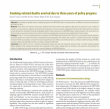
Evaluation of Smoking-related Deaths Averted Due to Three Years of Policy Progress, 2013
Author: Levy et al. (2013)
This study aims to determine the number of smoking-attributable deaths were averted due to the implementation of MPOWER policies.
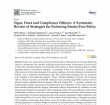
Review of Compliance Strategies for Enforcing SF policy
Author: Wynne et al. (2018)
Comprehensive literature review to provide evidence for effective enforcement strategies and suggest measures to improve policy compliance.
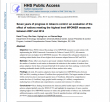
Seven years of progress in tobacco control: an evaluation of the effect of nations meeting the highest level MPOWER measures between 2007 and 2014
Author: Levy et al. (2018)
This study aims to evaluated the global progress of the six MPOWER measures and their impact across 88 countries that have adopted one or more measure from 2007 to 2014.
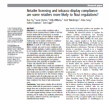
Retailer licensing and tobacco display compliance, Australia
Author: Fry et al. (2016)
This study aims to assess vendor licensing compliance and scheme to explore variations in compliance among different retailer types and locations.
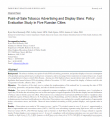
POS Tobacco Advertising and Display Bans in 5 Russian Cities
Author: Kennedy et al. (2017)
This study aims to evaluate the implementation of national TAPS law in kiosks across five Russian cities.
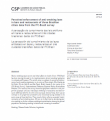
Perceived Enforcement of Smokefree in Brazil
Author: Mendes et al. (2017)
The aim of this study is to evaluate the perceived enforcement of anti-smoking legislation on 4 Brazilian cities.
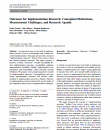
Outcomes for Implementation Research: Conceptual Distinctions, Measurement Challenges, and Research Agenda
Author: Proctor et al. (2010)
This paper proposes a general working taxonomic of eight implementation elements to measure implementation outcomes, advance implementation processes, and improve effectiveness of implementation strategies.
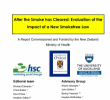
Evaluation of the Impact of Smokefree Law, New Zealand
Author: New Zealand MoH
The aim of this evaluation is to identify outcomes related to the 2003 Smokefree Environments Amendment Act and assess how closely goals were met.
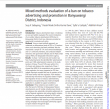
Mixed-methods Evaluation TAPS ban in Banyuwangi, Indonesia
Author: Sebayang et al. (2019)
This policy evaluation reviews the outdoor tobacco advertisement ban in Banyuqangi District East Java, Indonesia.
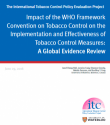
Global Evidence Review on the Implementation and Effectiveness of TC Measures
Author: The International Tobacco Control Policy Evaluation Project
This report reviews the global evidence on the impact of the WHO FCTC implementation of tobacco control legislation.

Indicators to Measure Success of Smoke-free Policies
Author: Niskar et al. (2008)
This article assess indictors of smokefree policy implementation in the Unites States, New Zealand, and Israel to demonstrate successful compliance of smokefree policies.
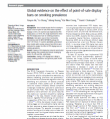
Evidence on the Effect of POS Display Bans on Smoking Prevalence
Author: He et al. (2018)
This study evaluates the effect of point-of-sale display bans globally as of 2016.
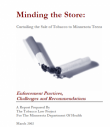
Evaluation of Enforcement Barriers in Minnesota Youth, 2002
Author: The Tobacco Law Project
This report evaluates the enforcement practices, and barriers of the Commercial Youth Access Enforcement efforts in Minnesota, USA, providing recommendation for future enforcement efforts.

Compliance Evaluation of San Francisco's Flavoured Tobacco Sales Prohibition
Author: Vyas et al. (2021)
This research assesses compliance with San Francisco's 2018 flavored tobacco sales ban and concludes that retailer education prior to enforcement will result in higher compliance rates.
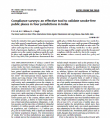
Evaluation of Compliance to Gutka Ban & Other Provisions of COTPA India
Author: Pimple et al. (2014)
This article uses a random sampling process to evaluate compliance with the COPTA legislation in India.
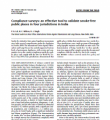
Compliance Surveys: Smokefree compliance tools in India
Author: Lal et al. (2011)
This article demonstrates how smokefree compliance can be assessed through simple and cost-effective survey tools and can be used to validate implementation and enforcement progress.
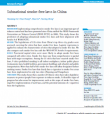
China Subnational Smokefree Law Predictors
Author: Lin et al. (2019)
This study analyzes the predictors of adopting subnational smokefree laws since China ratified the WHO FCTC in 2005 and assess their alignment with article 8.
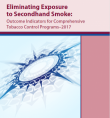
CDC Indicators for Eliminating Exposure to Secondhand Smoke, 2017
Author: US CDC
This report is the third in the CDC's publications on Evaluating Comprehensive Tobacco Control Programs and provides an evaluation logic model and set out outcome indicators that address eliminating exposure to secondhand smoke.
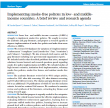
Implementing smoke-free policies in low- and middle-income countries: A brief review and research agenda
Author: Byron et al. (2019)
A review and research agenda on the challenges of implementing smokefree policies in low- and middle-income countries, identifying five areas where progress is urgently needed.

Explaining Mechanisms that Influence Smoke-free Implementation at the Local Level
Author: Mlinarić et al. (2019)
Study that analyzes existing smokefree evidence and translates it into recommendations to improve smokefree implementation in outdoor venues.
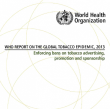
WHO Report on the Global Tobacco Epidemic, 2013
Author: World Health Organization
This report, WHO’s fourth in the series, provides a country-level examination of the global tobacco epidemic and identifies countries that have applied selected measures for reducing tobacco use. This report focuses on Enforcing bans on tobacco advertising, promotion and sponsorship.
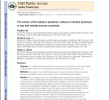
Vector of the Tobacco Epidemic Tobacco Industry Practices in LMICs
Author: Lee et al. (2012)
This article reviews published research on tobacco industry activities that interfere with tobacco control policies and encourage tobacco use in LMICs to more thoroughly understand industry practices and strategies in LMICs.

UCSF Truth Tobacco Industry Documents Database
Author: University of California San Francisco
The University of California San Francisco database contains over 14 million archived documents on tobacco industry activities, including advertising, manufacturing, marketing, scientific research, and political activities. In particular, the database provides access to internal industry documents made public during United States v. Philip Morris USA Inc., et al. and other litigation cases.
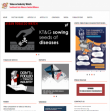
Tobacco Control Industry Watch - Southeast Asia Tobacco Control Alliance
Author: SEATCA
Tobacco Control Industry Watch provides facts and figures, publications, and media updates for the South East Asian Tobacco Control Alliance (SEATCA). With a focus on Articles 5.3 and 13, guidelines, toolkits, and in-country statuses are also available to further the effective implementation of the WHO FCTC in ASEAN countries.

Tobacco Unmasked
Author: Centre for Combating Tobacco
Tobacco Unmasked is the information portal of the Centre for Combating Tobacco in Sri Lanka. It provides information and profiles on tobacco companies, their employees, their allies, and other institutions linked with them. The portal also describes industry strategies and arguments against tobacco control efforts.
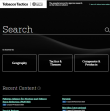
Tobacco Tactics: The essential source for rigorous research on the tobacco industry
Author: The University of Bath
Tobacco Tactics investigates tobacco industry strategies and tactics for undermining tobacco control efforts and provides rigorously researched reports, profiles, and information on industry players, allies, and activities.
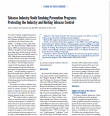
Tobacco Industry Youth Smoking Prevention Programs: Protecting the Industry and Hurting Tobacco Control
Author: Landman et al. (2002)
This article analyzes tobacco industry documents to determine why industry-sponsored youth smoking prevention programs were developed, how they were used to fight tobacco control policy and programming, and their lack of effect on youth smoking prevalence.
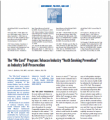
The ‘‘We Card’’ Program: Tobacco Industry ‘‘Youth Smoking Prevention’’ as Industry Self-Preservation
Author: Apollonio et al. (2008)
This article analyzes the tobacco industry self-regulation "We Card" program. It exposes "We Card" as ineffective and structured to improve the industry's public image and limit tobacco control policies and their enforcement.

Stopping Tobacco Organizations and Products - A Global Tobacco Industry Watchdog
Author: STOP
Stopping Tobacco Organizations and Products (STOP) works to understand and expose the tobacco industry’s efforts to derail tobacco control and hook a new generation of users. STOP's Resources Archive arms and supports stakeholders with tools and resources to counter the industry, including the latest analyses, reports, and information on the industry’s tactics.
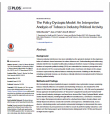
Policy Dystopia Model Interpretive Analysis of TI Political Activity
Author: Ulucaniar et al. (2016)
This article outlines a model that provides an evidence-based summary of corporate political strategies used by the tobacco industry. The model enables public health practitioners to anticipate these strategies and develop realistic assessments of the industry’s claims.

Observatory on Strategies of the Tobacco Industry in Brazil
Author: The Observatory
This website offers detailed information and data on the tactics used by the tobacco industry in Brazil, the legislative measures Brazil is adopting to meet FCTC and WHO directives, and the people and organizations involved with the tobacco industry that lobby against tobacco control measures in Brazil. The website is available in English, Portuguese, and Spanish.
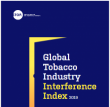
Global Tobacco Industry Interference Index, 2019
Author: STOP
This report uses publicly available information on tobacco industry interference in 33 countries and their respective governments’ responses to these interferences to interpret key findings and rank the countries on several interference indicators.
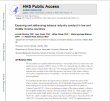
Exposing and Addressing Tobacco Industry Conduct in LMICs
Author: Gilmore et al. (2015)
This article explores the tobacco industry's practices in low and middle-income countries (LMICs), given the industry's growing interest, investment, and interference in these regions. It focuses on how exposing the industry's misconduct is necessary for both the implementation of the WHO FCTC and more 'endgame' solutions to the tobacco epidemic.

The Economic Impact of Clean Indoor Air Laws
Author: Eriksen & Chaloupka (2007)
This article reviews and analyses the diffusion of clean indoor air laws and the economic and public health impacts of their implementation. While research sponsored by the tobacco industry has raised concerns regarding the economic impact of smoke-free laws, scientific evidence indicates that clean indoor air laws are low-cost, safe, and effective.

Campaign for Tobacco-Free Kids Industry Watch
Author: Campaign for Tobacco-Free Kids
The Campaign for Tobacco-Free Kids Industry Watch project seeks to hold the tobacco industry accountable by providing facts about how tobacco companies operate and working to expose and stop the industry’s harmful activities. The Industry Watch website contains helpful resources, including factsheets, industry profiles, reports and studies, presentations, press releases, and key websites.

STOP Crooked 9: Nine ways the Tobacco Industry Undermines Health Policy
Author: STOP
The Crooked Nine report outlines the tobacco industry's strategies, techniques, and tactics to undermine tobacco control using case studies from around the world. It is designed to help the tobacco control community predict the industry's actions and counter industry interference.

African Tobacco Industry Monitoring
Author: The Africa Centre For Tobacco Industry Monitoring
The Africa Centre For Tobacco Industry Monitoring And Policy Research (ATIM) is an observatory that offers up-to-date information on activities and developments in the tobacco industry that could have an impact on tobacco control policies. ATIM provides industry monitoring across Africa, as recommended by the Guidelines for implementation of Article 5.3 of the WHO FCTC, evaluates the impact of tobacco control policy, and informs stakeholders within the tobacco control community of ongoing developments.
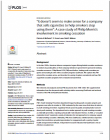
Case Study: PMI Involvement in Smoking Cessation
Author: McDaniel et al. (2017)
This article is a case study ion Philip Morris' involvement in the cessation arena and an evaluation of how and why PM supports cessation programs. It illustrates a notable example of industry interference that undermines effective tobacco control.
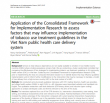
Assessment of Factors that Influence Implementation of Tobacco Use Treatment Viet Nam
Author: VanDevanter et al. (2017)
Application of the Consolidated Framework for Implementation Research (CFIR) to assess factors that may influence implementation of tobacco use treatment guidelines in the Viet Nam public health care delivery system.
